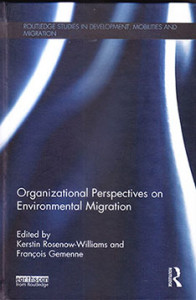 One article titled Climate-induced migrants need dignified recognition’ written by Syed Aminul Haque, Coordinator-Secretariat of EquityBD has recently published in an intentional book. The book titled Organizational Perspectives on Environmental Migration’ has been published by Routledge of London and New York. The book is a collection of chapters exploring how organizations have responded to migration and displacement linked to environmental change. Academics and practitioners explore how environmental migration has shaped the work of their organizations and projects. The book is edited by François Gemenne and Kerstin Rosenow-Williams.
One article titled Climate-induced migrants need dignified recognition’ written by Syed Aminul Haque, Coordinator-Secretariat of EquityBD has recently published in an intentional book. The book titled Organizational Perspectives on Environmental Migration’ has been published by Routledge of London and New York. The book is a collection of chapters exploring how organizations have responded to migration and displacement linked to environmental change. Academics and practitioners explore how environmental migration has shaped the work of their organizations and projects. The book is edited by François Gemenne and Kerstin Rosenow-Williams.
Aminul Haque in his article talks about the vulnerability of Bangladesh due t climate change, major scenario of climate migrants in the country, government practices to address the problem, EquityBD’s campaign on this issue, challenges in future dealing with climate migrants, on way forward of the issue.
The preface of the book says, over the past decade, international organizations (IOs) and non-governmental organizations (NGOs) have increasingly focused their efforts on the plight of environmental migrants in both industrialized and developing countries. However, to date very few studies have analyzed the influence and rhetoric of advocacy groups in the debates on environmental migration. Organizational Perspectives on Environmental Migration fills this lacuna by drawing together and examining the related themes of climate change and environmental degradation, migration and organizational studies to provide a fresh perspective on their increasing relevance. In order to assess the role of IOs and NGOs in the environmental migration discourse and to understand their interaction and their ways of addressing the topic, the book contains a wide-range of contributions covering the perspectives of organizational sociologists, political scientists, anthropologists, geographers, lawyers and practitioners. The chapters are organized thematically around the perspectives of key actors in the area of environmental migration, including IOs, courts and advocacy groups. The geographically diverse and interdisciplinary range of contributions makes this volume an essential foundational text for organizational responses to environmental migration. This volume will be of great interest to students and scholars of migration studies, international relations, organizational sociology, refugee law and policy, and development studies.









